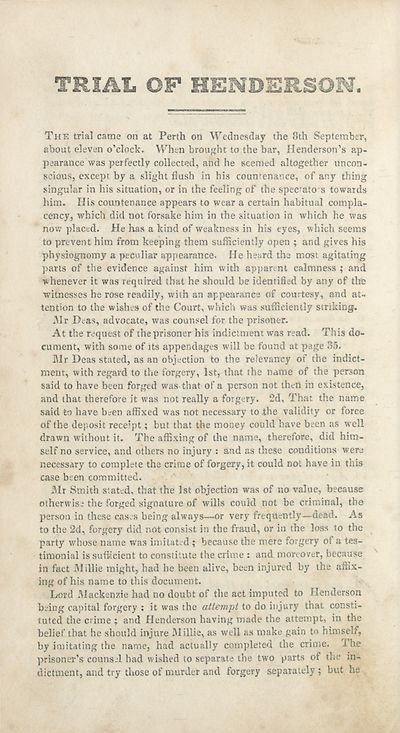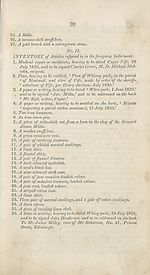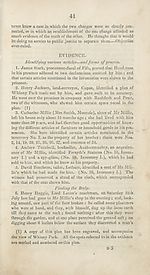Download files
Complete book:
Individual page:
Thumbnail gallery: Grid view | List view

TRIAL OF HENDERSON,
The trial came on at Perth on Wednesday the 8th September,
about eleven o’clock. When brought to the bar, Henderson’s ap¬
pearance was perfectly collected, and he seemed altogether uncon¬
scious, except by a slight flush in his countenance, of any thing
singular in his situation, or in the feeling of the spectato s towards
him. His countenance appears to wear a certain habitual compla¬
cency, which did not forsake him in the situation in which he was
“ now placed. He has a kind of weakness in his eyes, which seems
to prevent him from keeping them sufficiently open ; and gives his
physiognomy a peculiar appearance. He heard the most agitating
parts of the evidence against him with apparent calmness ; and
whenever it was required that he should be identified by any of the
witnesses he rose readily, with an appearance of courtesy, and at¬
tention to the wishes of the Court, which was sufficiently striking.
.Mr IXas, advocate, was counsel for the prisoner.
At the request of the prisoner his indictment was read. This do¬
cument, with some of its appendages will be found at page 35.
Mr Deas stated, as an objection to the relevancy of the indict¬
ment, with regard to the forgery, lstr that the name of the person
said to have been forged was that of a person not then in existence,
and that therefore it was not really a forgery. 2d, That the name
said to have been affixed was not necessary to the validity or force
of the deposit receipt; but that the money could have been as well
drawn without it. The affixing of the name, therefore, did him¬
self no service, and others no injury : and as these conditions were
necessary to complete the crime of forgery, it could not have in this
case been committed.
Mr Smith stated, that the 1st objection was of no value, because
otherwise the forged signature of wills could not be criminal, the
person in these cases being always—or very frequently—dead. As
to the 2d, forgery did not consist in the fraud, or in the loss to the
party whose name was imitated; because the mere forgery of a tes¬
timonial is sufficient to constitute the crime : and moreover, because
in fact M illie might, had he been alive, been injured by the affix¬
ing of his name to this document.
Lord Mackenzie had no doubt of the act imputed to Henderson
being capital forgery : it was the attempt to do injury that consti¬
tuted the crime ; and Henderson having made the attempt, in the
belief that he should injure Millie, as well as make gain to himself,
by imitating the name, had actually completed the crime. The
prisoner’s couns.l had wished to separate the two parts of the in¬
dictment, and try those of murder and forgery separately; but he
The trial came on at Perth on Wednesday the 8th September,
about eleven o’clock. When brought to the bar, Henderson’s ap¬
pearance was perfectly collected, and he seemed altogether uncon¬
scious, except by a slight flush in his countenance, of any thing
singular in his situation, or in the feeling of the spectato s towards
him. His countenance appears to wear a certain habitual compla¬
cency, which did not forsake him in the situation in which he was
“ now placed. He has a kind of weakness in his eyes, which seems
to prevent him from keeping them sufficiently open ; and gives his
physiognomy a peculiar appearance. He heard the most agitating
parts of the evidence against him with apparent calmness ; and
whenever it was required that he should be identified by any of the
witnesses he rose readily, with an appearance of courtesy, and at¬
tention to the wishes of the Court, which was sufficiently striking.
.Mr IXas, advocate, was counsel for the prisoner.
At the request of the prisoner his indictment was read. This do¬
cument, with some of its appendages will be found at page 35.
Mr Deas stated, as an objection to the relevancy of the indict¬
ment, with regard to the forgery, lstr that the name of the person
said to have been forged was that of a person not then in existence,
and that therefore it was not really a forgery. 2d, That the name
said to have been affixed was not necessary to the validity or force
of the deposit receipt; but that the money could have been as well
drawn without it. The affixing of the name, therefore, did him¬
self no service, and others no injury : and as these conditions were
necessary to complete the crime of forgery, it could not have in this
case been committed.
Mr Smith stated, that the 1st objection was of no value, because
otherwise the forged signature of wills could not be criminal, the
person in these cases being always—or very frequently—dead. As
to the 2d, forgery did not consist in the fraud, or in the loss to the
party whose name was imitated; because the mere forgery of a tes¬
timonial is sufficient to constitute the crime : and moreover, because
in fact M illie might, had he been alive, been injured by the affix¬
ing of his name to this document.
Lord Mackenzie had no doubt of the act imputed to Henderson
being capital forgery : it was the attempt to do injury that consti¬
tuted the crime ; and Henderson having made the attempt, in the
belief that he should injure Millie, as well as make gain to himself,
by imitating the name, had actually completed the crime. The
prisoner’s couns.l had wished to separate the two parts of the in¬
dictment, and try those of murder and forgery separately; but he
Set display mode to:
![]() Universal Viewer |
Universal Viewer | ![]() Mirador |
Large image | Transcription
Mirador |
Large image | Transcription
| Antiquarian books of Scotland > Crime & punishment > Whinny Park murder > (54) |
|---|
| Permanent URL | https://digital.nls.uk/126151313 |
|---|
| Description | Thousands of printed books from the Antiquarian Books of Scotland collection which dates from 1641 to the 1980s. The collection consists of 14,800 books which were published in Scotland or have a Scottish connection, e.g. through the author, printer or owner. Subjects covered include sport, education, diseases, adventure, occupations, Jacobites, politics and religion. Among the 29 languages represented are English, Gaelic, Italian, French, Russian and Swedish. |
|---|

